There are dozens of DNA testing companies on the market, each offering similar data and insights. If you’re looking for hands-on genetic information on ancestry and health, 23andMe and CRI Genetics are two direct-to-customer (DTC) options you might want to consider.
While 23andMe is the more popular service, CRI Genetics can appear more appealing to some users due to its affordability. That said, you have to factor in additional service aspects before making your decision.
In this CRI Genetics vs. 23andMe analysis, we’ll compare the two services head-to-head for five essential service aspects, including genetic testing technology and quality of reports.
CRI Genetics: Personalized ancestry and health reports
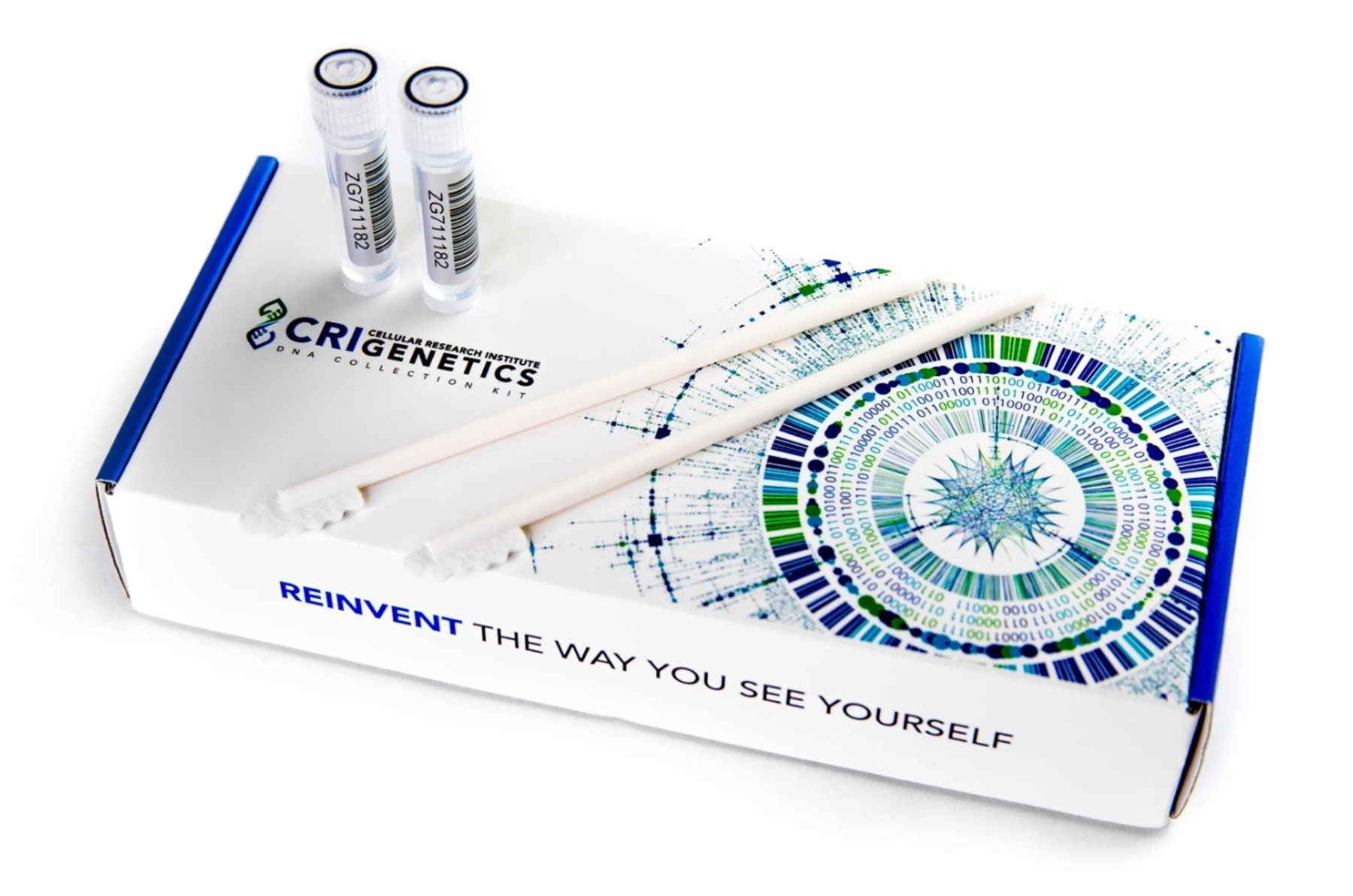
Source: CRI Genetics
CRI Genetics — short for Cellular Research Institute, Genetics Department — is a DTC genetic testing company that provides both ancestry and health reports. Additionally, the platform also offers nutrition and allergy analyses as separate products.
Like most other consumer-grade DNA tests, the platform analyzes your saliva sample to provide genetic insights. What helps CRI stand out in the crowd is its proprietary DNA algorithm created by renowned geneticist Dr. Alexei Fedorov. This algorithm uses Fedorov’s hand-selected genetic markers to map your ancestry with supposedly high accuracy.
You also get access to a CRI-exclusive Trait Tracer that tracks the inheritance of specific traits across generations, adding a more personalized layer to your DNA testing experience.
Another noteworthy aspect of the platform is its 8-Week Efficiency Guarantee, which means you’ll be refunded if your DNA reports aren’t ready within eight weeks of receiving your DNA. This is a refreshing promise as many DNA platforms often struggle to meet timely deliveries.
23andMe: Ancestry insights with comprehensive health plans
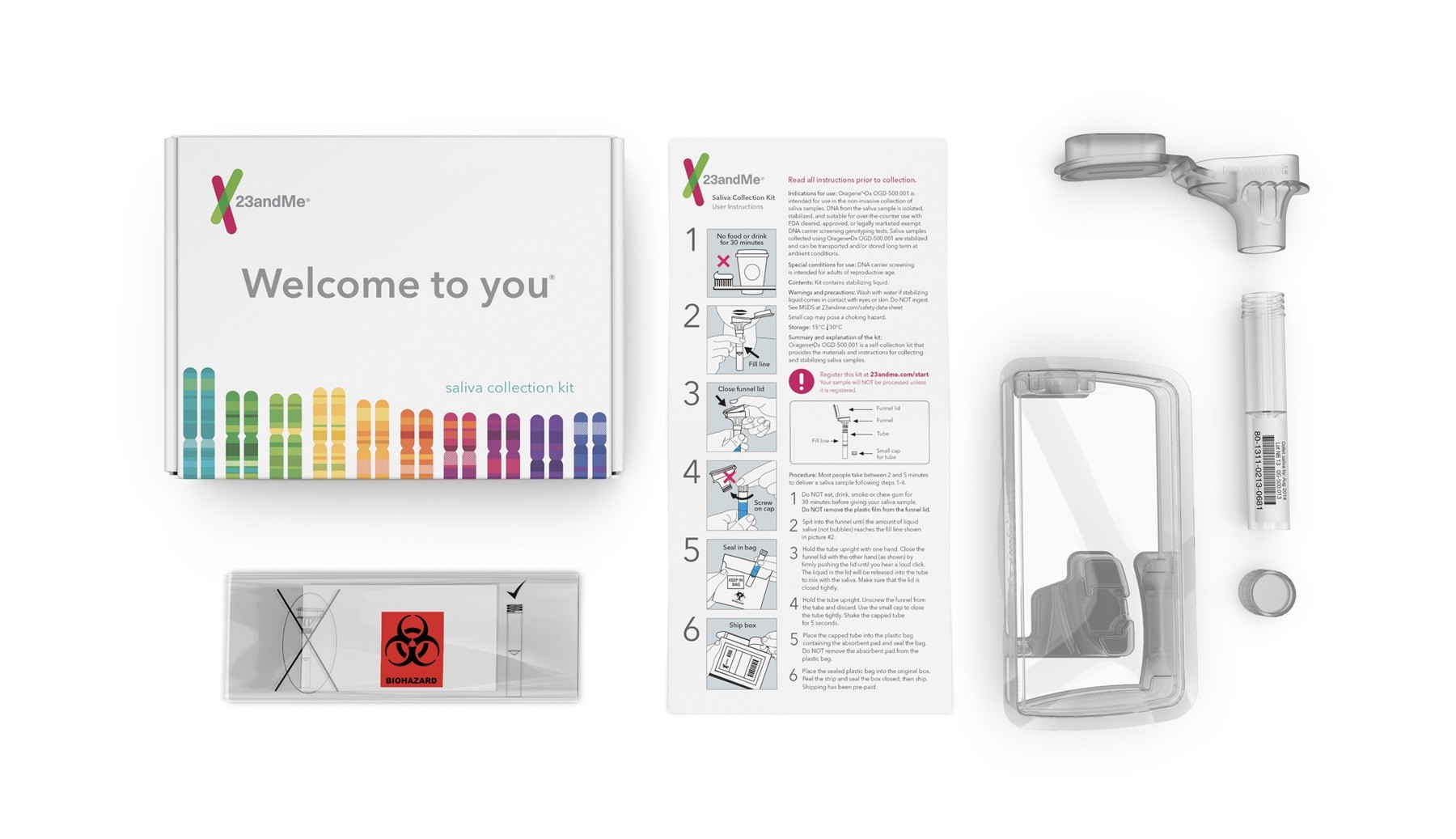
Source: 23andMe
23andMe is one of the most recognizable companies that offer DTC DNA testing. Based in California, the company has grown to have one of the largest DNA databases in the world, boasting over 14 million users.
23andMe offers two primary testing options: Ancestry and Health + Ancestry. You also have two membership options, Premium and Total Health, to access other features, such as:
Relative finder
Historical matches
Pharmacogenetics report
Health action plan
Cancer reports
The company uses a custom version of the Illumina Global Screening Array that can identify variants or genetic differences in medically relevant genes. In simple terms, 23andMe reports are shaped by the analysis of fixed areas in your DNA known to be associated with specific diseases or traits.
Bonus reads: The following 23andMe guides may interest you:
CRI Genetics vs. 23andMe: Detailed comparison
When you compare CRI Genetics to 23andMe, they will seem similar on the surface. Both offer DNA analyses that reveal details about your ancestry and provide insights into your genetic health. We’ll need to go into detail to understand their key differentiators.
Before we explore further, here's a quick run-down of each service:
In the following sections, we’ll look at the key differences between 23andMe vs. CRI Genetics across five aspects:
Genetic testing methods
Database size and ancestry reports
Quality of health insights
Pricing
Privacy, security, and legal issues
1. Genetic testing methods
Both CRI Genetics and 23andMe analyze your genetic markers using genotyping technology. Genotyping determines genetic predispositions by analyzing your DNA sequence, particularly focusing on specific genetic variations or markers. While both services use the same technology, their scope of testing may differ.
CRI Genetics analyzes 527,414 markers across your genome (or DNA content). These markers are mostly relevant to ancestry tracking, though, so they may not play a significant role in determining your health dispositions.
In contrast, 23andMe examines over 600,000 single-nucleotide polymorphisms (SNPs), which are the most common type of genetic variations found in DNA. SNPs can help map common diseases as well as variations in an individual's response to certain drugs.
As far as technology is concerned, both companies analyze less than 0.01% of the 6 billion DNA letters in your genome, which renders their analyses incomplete. Their testing methods are relatively outdated as many DNA platforms, such as Nucleus, Sequencing.com, and Nebula Genomics, use the more advanced whole-genome sequencing (WGS) to analyze your entire genome and provide more accurate and detailed genetic insights.
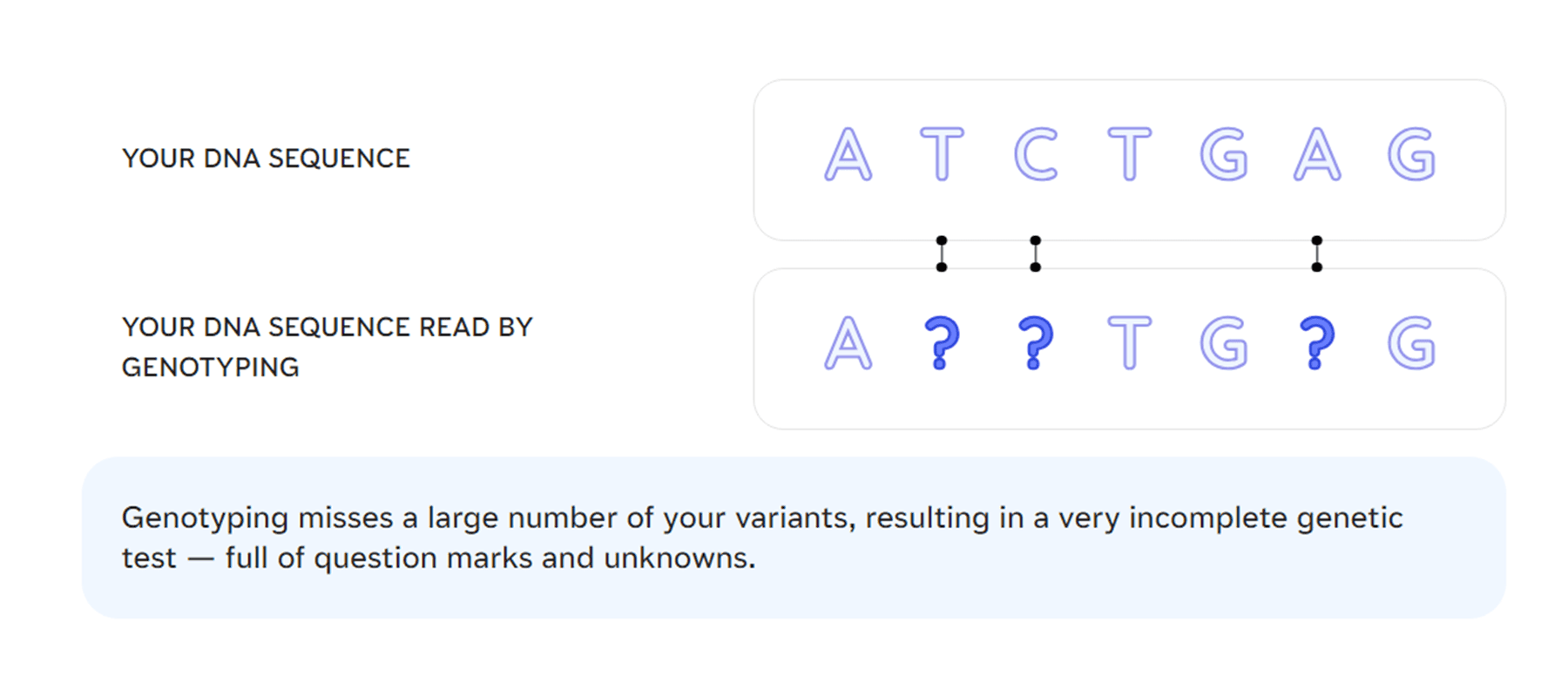
Source: Nucleus
2. Database size and ancestry reports
According to data from the International Society of Genetic Genealogy, 23andMe has one of the largest databases in the market, with DNA samples from 14+ million people. The platform offers a DNA Relatives feature that helps you connect with potential relatives within its massive database, making it a great option if you’re interested in discovering living relatives.
23andMe analyzes your genetic data across 47 populations and 3,000+ geographical regions to provide ethnicity estimates, as well as provides haplogroup analysis to outline your maternal and paternal lineage. The level of accuracy in painting your ethnicity may vary from user to user.
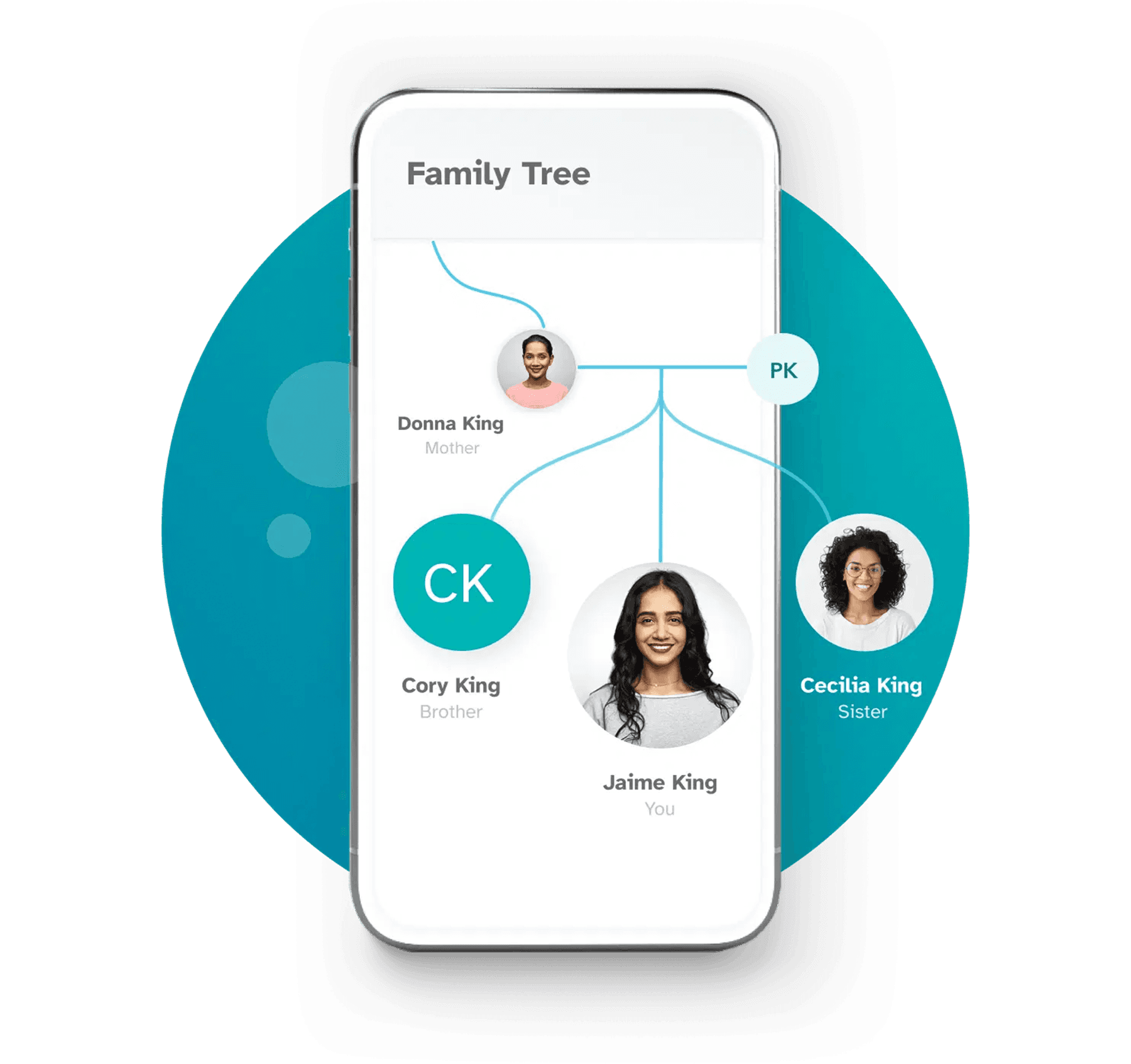
Source: 23andMe
CRI Genetics hasn’t disclosed the size of its database. Since it was founded in 2016, a decade after 23andMe, it’s likely the company’s database is much smaller. While most users were satisfied with their ancestry findings, some users reported having different results with other DNA services. Here’s what a user had to say:
CRI Genetics traces your ancestry up to 50 generations back, giving you a detailed breakdown of your heritage across various regions. It also includes a timeline that shows when specific ancestral groups entered your family lineage, along with haplogroup information.
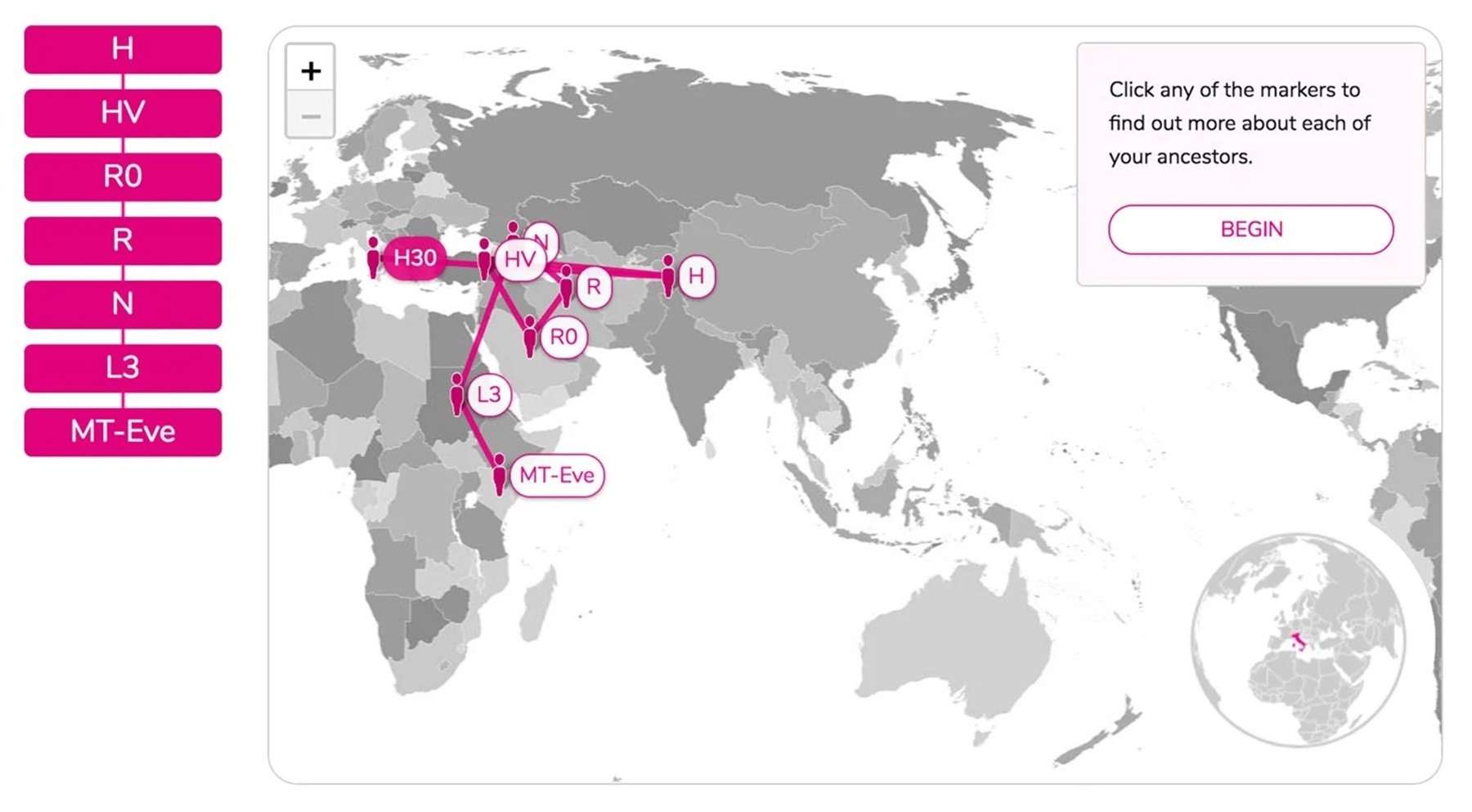
Source: CRI Genetics
3. Quality of health insights
CRI Genetics typically provides five health reports with its Health + Ancestry plan. You can learn about:
Unique health traits (such as stress response)
Energy reports about your sleep conditions, response to caffeine, etc.
Nutrition deficiencies
Your allergies, intolerances, and sensitivities
Metabolism and weight loss
The reports may come with some general lifestyle recommendations. It’s worth noting that many users have complained about their individual reports being locked behind credits despite paying for the full service. Here’s what one customer experienced:
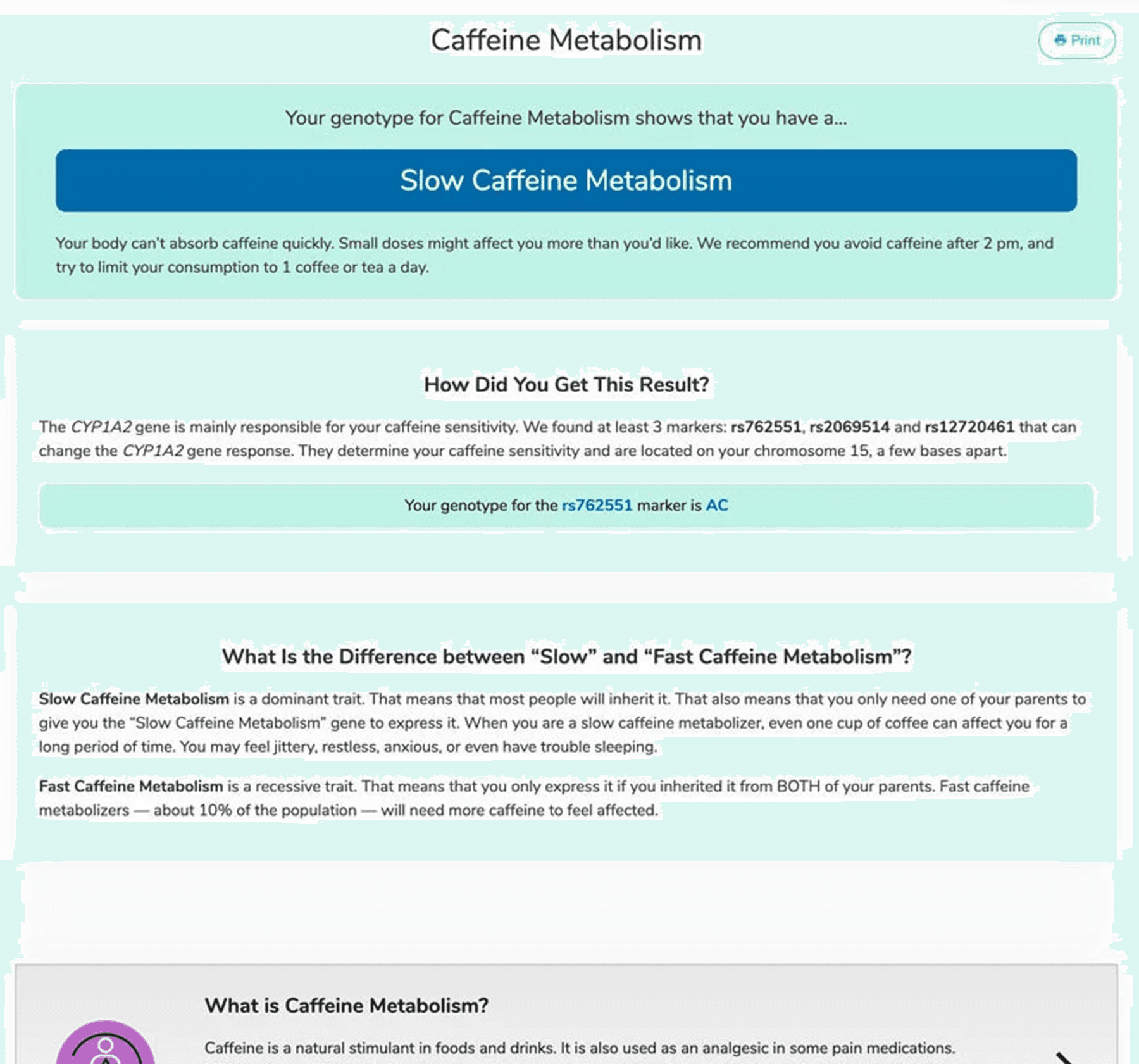
Source: CRI Genetics
23andMe gives you access to four types of reports outlining your:
Health predispositions
Pharmacogenetics
Carrier status
Wellness (your body’s response to sleep, exercise, and diet)
The reports offered by 23andMe and CRI Genetics are informational, not actionable. This ties back to their testing method, which only analyzes under 0.1% of your DNA and may fail to detect all your disease risks and predispositions.
Here’s what one 23andMe user shared about their experience:
Tip 💡
Most DNA health services use genotyping methods to scan your DNA, which leads to basic and vague results. If you need high-integrity health insights with clear and actionable reports, get tested with Nucleus.
Nucleus offers a clinical-grade DNA test that uses whole-genome sequencing to analyze ∼100% of your DNA with 99.9% accuracy. It also integrates genetic testing results with your lifestyle factors to offer personalized and comprehensive health recommendations.
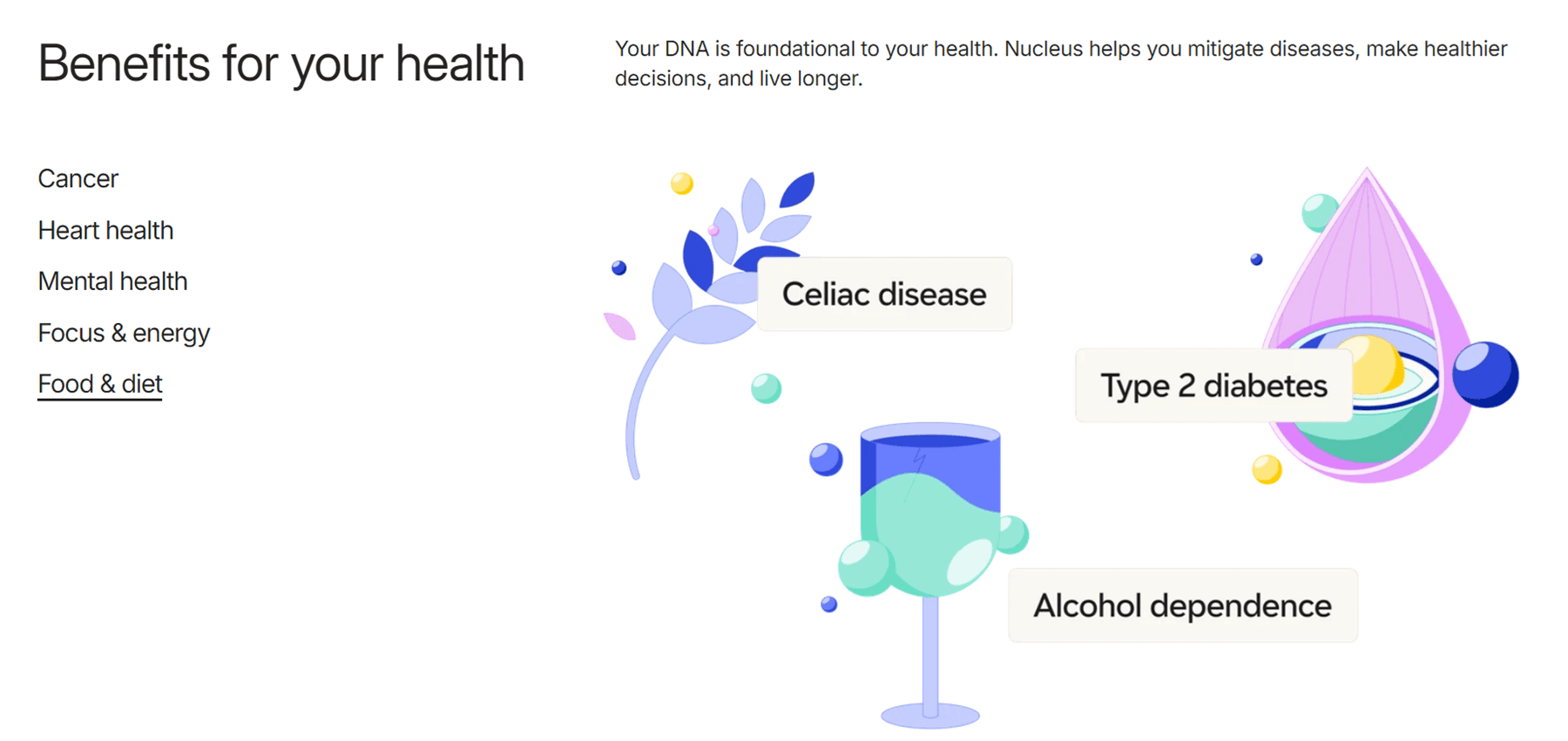
Source: Nucleus
4. Pricing
CRI Genetics has a simple pricing structure for its tests, with two core packages:
Ancestry + Traits for $189
Health + Ancestry for $349
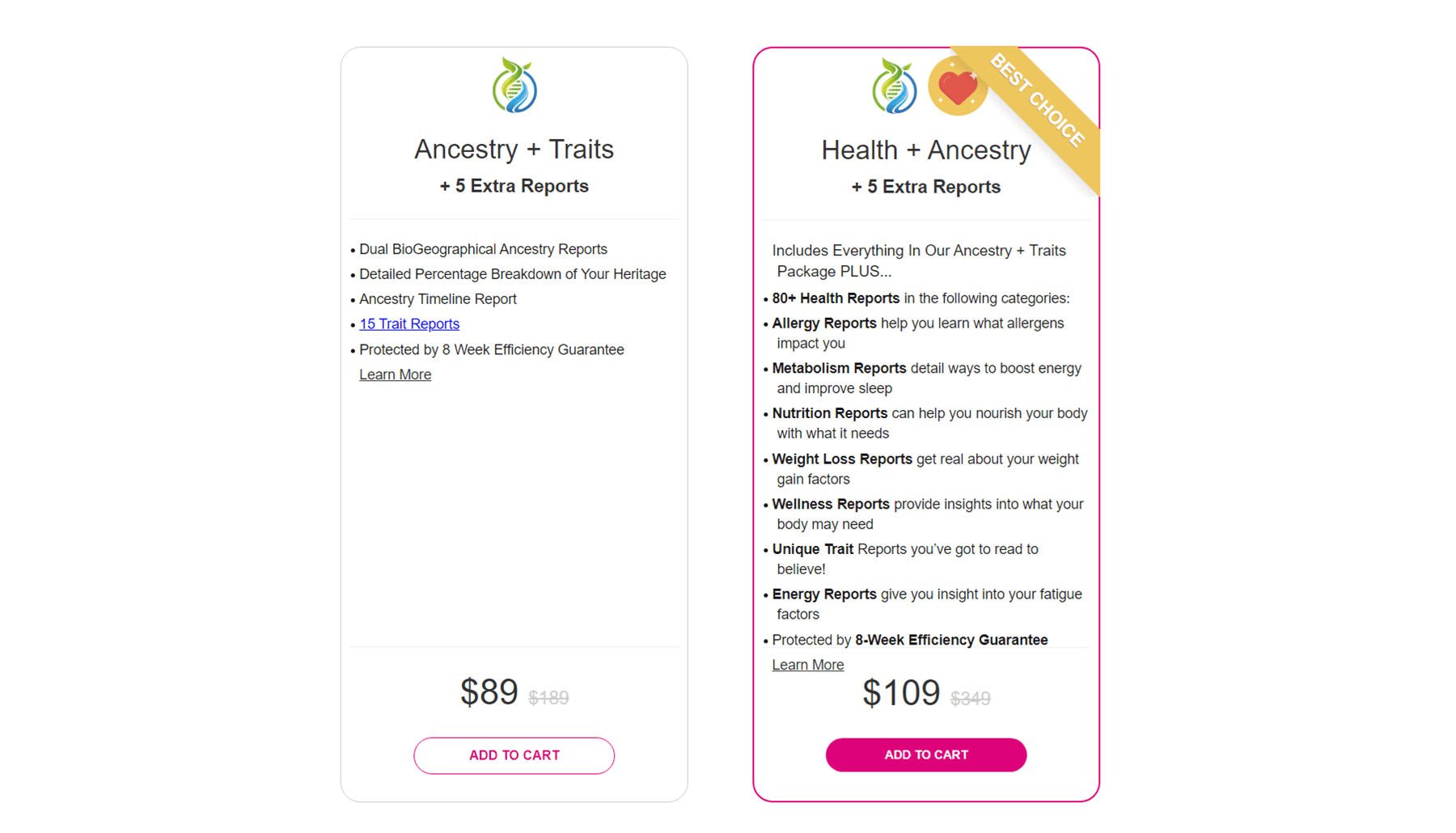
Source: CRI Genetics
It also provides bundled packages for more specific needs, like the Weight Loss or Allergy + Health kits. These bundled packages usually don’t cover premium services like ongoing new reports, which means you may have to spend more to unlock categories you may be interested in — and these costs add up quickly.
Here’s what a customer had to say about the service:
“Paying more money to unlock other categories isn’t something I was expecting. If I am paying already for my results I should get all of them without the extra money.”
23andMe offers a more flexible pricing structure, with options for both one-time purchases and ongoing memberships:
The 23andMe memberships are feature-packed, but they may be less worthwhile if you’re looking for comprehensive and accurate health insights. Some users have voiced their concerns about the constant price bumps for memberships.
5. Privacy, security, and legal issues
Both 23andMe and CRI Genetics encrypt all your data and promise not to share it with anyone unless it’s required by law.
CRI Genetics uses anonymized genetic data for its internal research. 23andMe also follows this practice, but they're more transparent about it and explicitly ask for your consent to participate in research. While that’s reassuring, there have been concerns about the company’s data security.
In 2023, 23andMe experienced a data breach that exposed the personal information of 6.9 million customers. The company claims to have introduced more robust security measures since then, which led to many users being locked out of their accounts.
While CRI Genetics did not report any security incident, it was recently accused of deceptive practices for “deceiving consumers about the accuracy of its test reports, falsely claiming to have patented an algorithm for its genetic matching process, and using fake reviews and testimonials on its websites.”
The company paid a $700,000 civil penalty to settle the joint complaint made by the Federal Trade Commission and the California Attorney General, as well as agreed to avoid misleading practices.
CRI vs. 23andMe: Which one should you choose?
When it comes to choosing between CRI Genetics and 23andMe, you’ll have to consider your priorities.
If you’re interested in getting detailed ancestry insights, most ancestry tests, including CRI Genetics, provide a good snapshot of your ancestry. Still, you might have a better chance of finding relatives with 23andMe due to its massive database.
If you’re looking for precise health insights, though, neither of these services might work for you because of their outdated technology. You need to explore platforms that offer whole-genome sequencing to extract complete insights from your DNA.
Nucleus is the most affordable and accessible option if you’re looking for a WGS genetic test in the U.S. By analyzing nearly 100% of your DNA, Nucleus gives you a comprehensive picture of your health, including insights about:
Heart, mental, and neurological health
Energy levels
Food and diet predispositions
Genetic disease risks
Hereditary carriers
Rare and high-effect genetic variants that may cause serious illnesses (other tests tend to completely miss these insights)
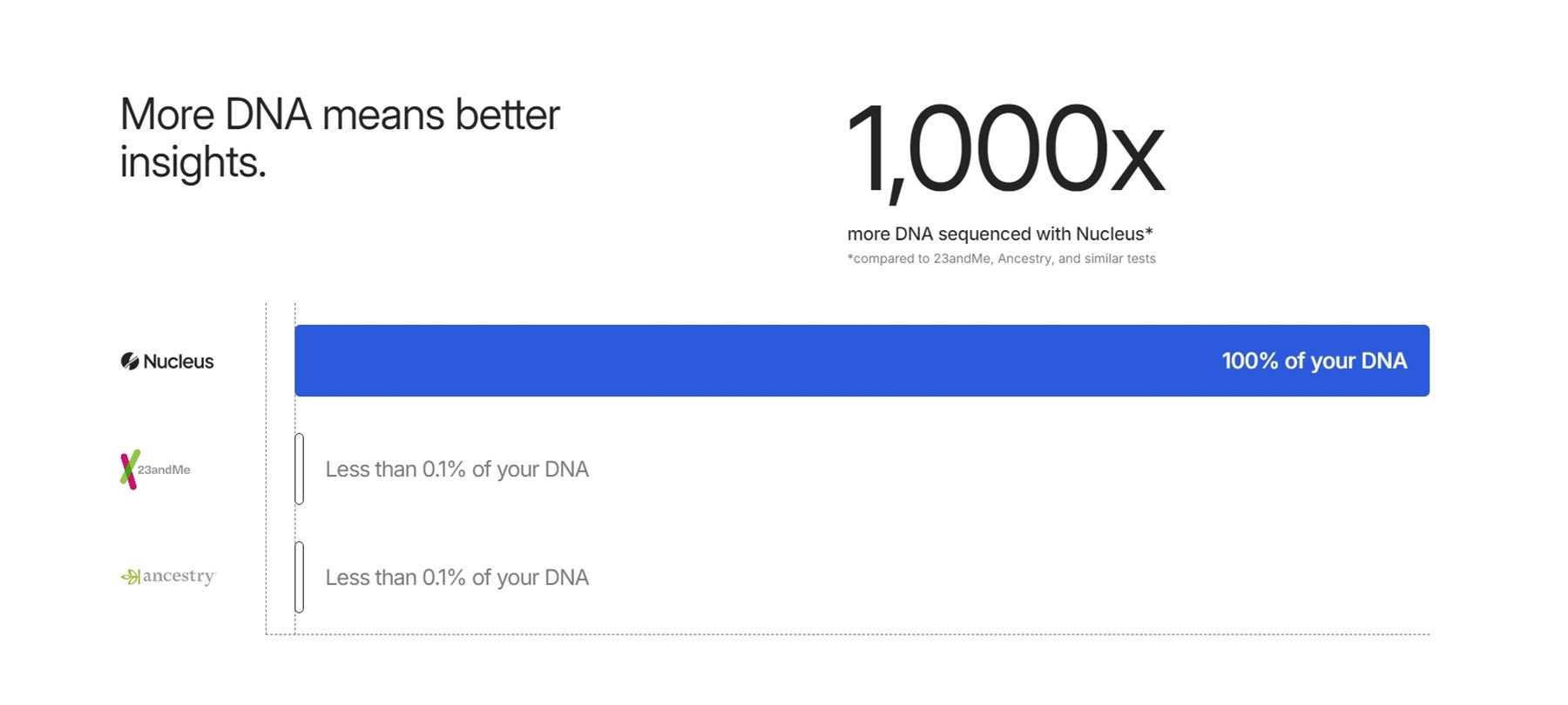
Source: Nucleus
Build your blueprint for better health with Nucleus
With Nucleus, you can have better ownership over your health and longevity outcomes through more accurate and practical health insights. The platform digs deep and analyzes nearly all the genetic variants that make you unique. This gives you a deeper look into your health risks and genetic traits compared to genotyping-based platforms like CRI Genetics or 23andMe.
Here are some key benefits that make Nucleus an excellent solution for supporting your self-discovery and health choices:
Input of lifestyle factors: Nucleus takes in your lifestyle factors such as age, BMI, and smoking habits to inform its genetic reports and provide more personalized risk scores.
Trait and IQ analyses: The platform’s traits and IQ analyses give you insights into genetic dispositions and intelligence scores unique to you.
Easy-to-follow reports: Nucleus converts complex genetic data into clear reports to minimize interpretation barriers.
Genetic counseling: Nucleus tests are physician-approved and can be used for further medical counseling. You can also reach out to board-certified genetic counselors via the platform.
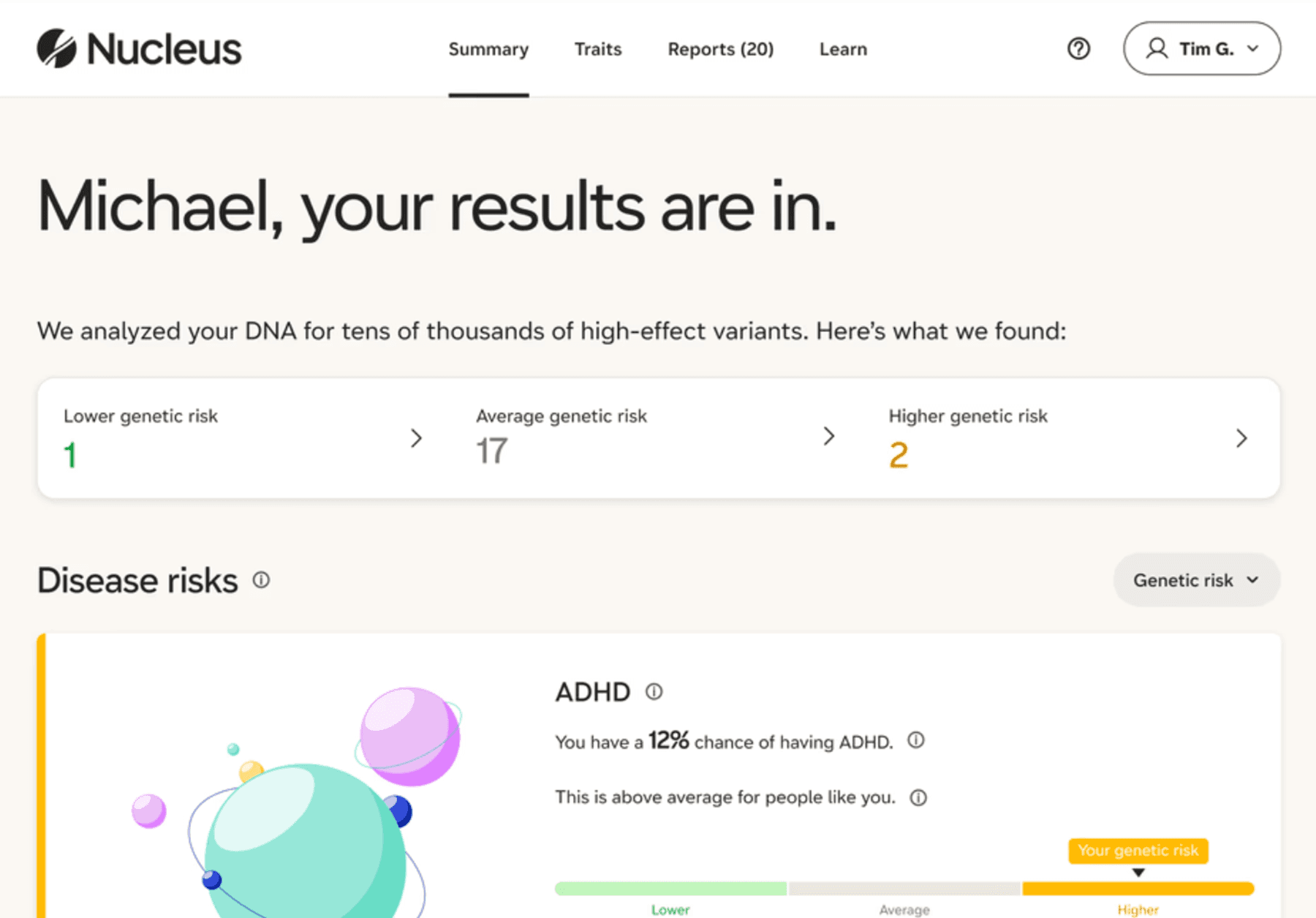
Source: Nucleus
What about security or privacy? Nucleus is HIPAA-compliant and conducts testing in highly regulated, CAP/CLIA-certified labs. Your samples are processed in the U.S. and on U.S. machines for better security.
How to get started with Nucleus
Nucleus offers a one-time [PRICE.KIT_SOLO.ONE] DNA test (FSA/HSA eligible) that gives you access to all available reports, including the new ones being added to the database. You can also ask Nucleus to update your reports ongoingly to factor in lifestyle changes or new genetic research.
Here’s how to get started:
Add your personal information
Place your order
You’ll get a cheek swab collection kit delivered at your doorstep. Once you mail back your sample, you can expect the results delivered to your account in 6–8 weeks.
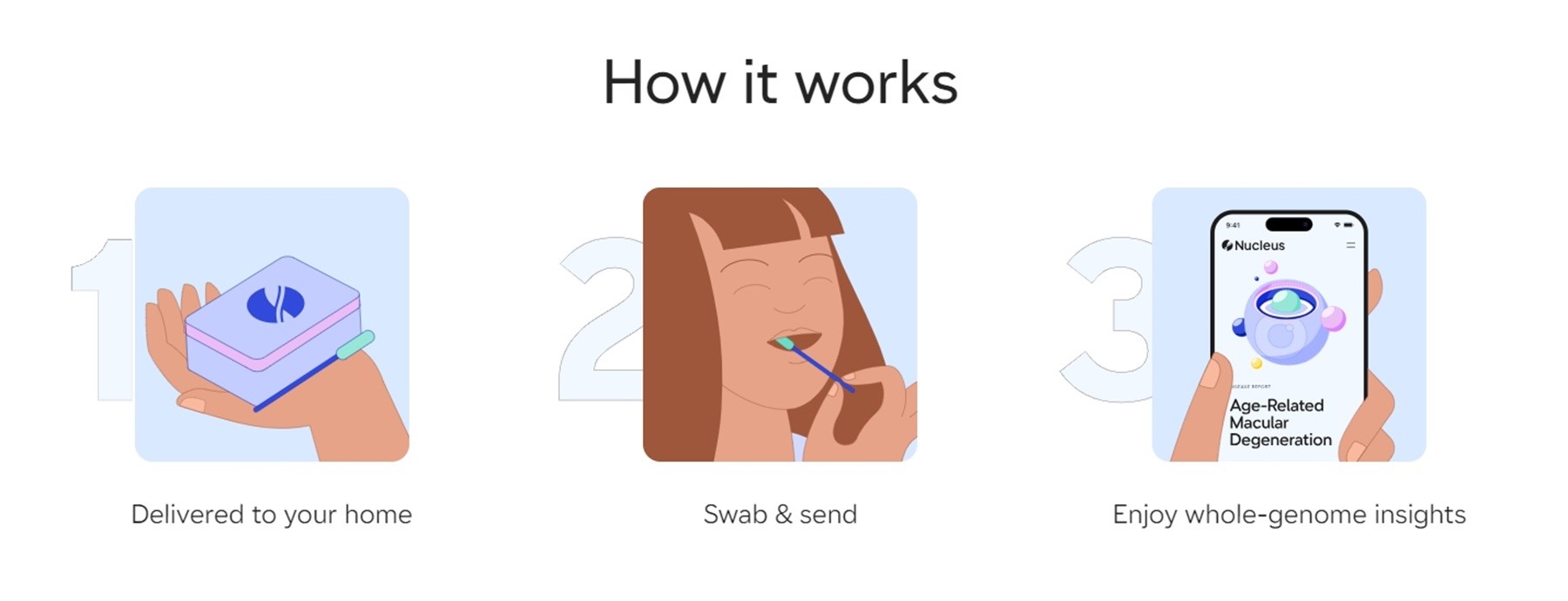
Source: Nucleus
You may also like…
We have reviewed many genetic testing services — access our guides from the table below:
Featured Image Source: JC Gellidon












